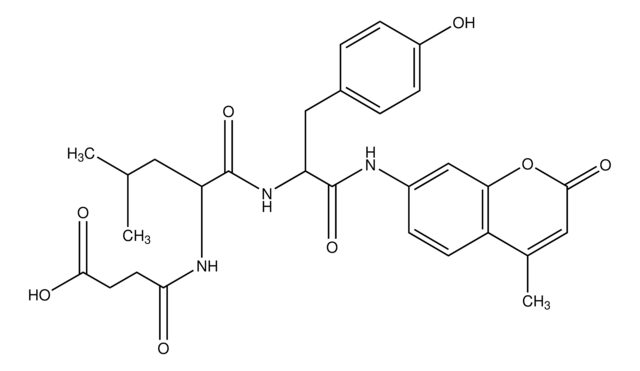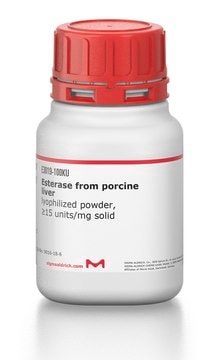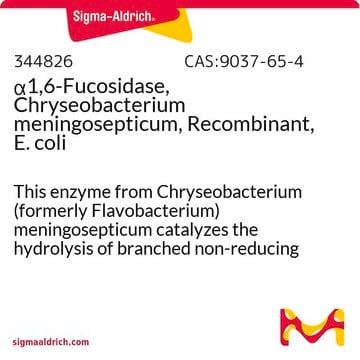36-011
Anti-nitro-α/β-Synuclein Antibody, clone nSyn12
clone nSyn12, Upstate®, from mouse
Sign Into View Organizational & Contract Pricing
All Photos(1)
About This Item
UNSPSC Code:
12352203
eCl@ss:
32160702
NACRES:
NA.41
Recommended Products
biological source
mouse
Quality Level
antibody form
ascites fluid
antibody product type
primary antibodies
clone
nSyn12, monoclonal
species reactivity
human
manufacturer/tradename
Upstate®
technique(s)
immunohistochemistry: suitable
western blot: suitable
NCBI accession no.
shipped in
dry ice
Gene Information
human ... SNCA(6622)
Specificity
α-Synuclein nitrated at Tyr125 and Tyr136
β-Synuclein nitrated at Tyr130
β-Synuclein nitrated at Tyr130
Application
Anti-nitro-α/β-Synuclein Antibody, clone nSyn12 is an antibody against nitro-α/β-Synuclein for use in WB, IH.
Quality
rountinely evaluated on recombinant protein nitrated in vitro
Target description
α-Synuclein, Mr 14.5kDa
β-Synuclein, Mr 17kDa
β-Synuclein, Mr 17kDa
Physical form
Format: Unpurified
Legal Information
UPSTATE is a registered trademark of Merck KGaA, Darmstadt, Germany
Not finding the right product?
Try our Product Selector Tool.
Storage Class Code
10 - Combustible liquids
WGK
WGK 1
Certificates of Analysis (COA)
Search for Certificates of Analysis (COA) by entering the products Lot/Batch Number. Lot and Batch Numbers can be found on a product’s label following the words ‘Lot’ or ‘Batch’.
Already Own This Product?
Find documentation for the products that you have recently purchased in the Document Library.
Bregje W M de Wildt et al.
Biotechnology and bioengineering, 120(7), 2013-2026 (2023-05-06)
The transition in the field of bone tissue engineering from bone regeneration to in vitro models has come with the challenge of recreating a dense and anisotropic bone-like extracellular matrix (ECM). Although the mechanism by which bone ECM gains its
Ashley D Reynolds et al.
Journal of neurochemistry, 104(6), 1504-1525 (2007-11-27)
Microglial neuroinflammatory processes play a primary role in dopaminergic neurodegeneration for Parkinson's disease (PD). This can occur, in part, by modulation of glial function following activation by soluble or insoluble modified alpha-synuclein (alpha-syn), a chief component of Lewy bodies that
B I Giasson et al.
The Journal of biological chemistry, 274(12), 7619-7622 (1999-03-13)
alpha-Synuclein is a soluble presynaptic protein which is pathologically redistributed within intracellular lesions characteristic of several neurodegenerative diseases. Here we demonstrate that wild type and two mutant forms of alpha-synuclein linked to familial Parkinson's disease (Ala30 --> Pro and Ala53
Emilio Fernández-Espejo et al.
Antioxidants (Basel, Switzerland), 10(5) (2021-06-03)
Background. Salivary α-synuclein (aSyn) and its nitrated form, or 3-nitrotyrosine-α-synuclein (3-NT-αSyn), hold promise as biomarkers for idiopathic Parkinson's disease (IPD). Nitrative stress that is characterized by an excess of 3-nitrotyrosine proteins (3-NT-proteins) has been proposed as a pathogenic mechanism in
J M Souza et al.
The Journal of biological chemistry, 275(24), 18344-18349 (2000-04-05)
Intracellular proteinaceous aggregates are hallmarks of many common neurodegenerative disorders, and recent studies have shown that alpha-synuclein is a major component of several pathological intracellular inclusions, including Lewy bodies in Parkinson's disease (PD) and glial cell inclusions in multiple system
Our team of scientists has experience in all areas of research including Life Science, Material Science, Chemical Synthesis, Chromatography, Analytical and many others.
Contact Technical Service







